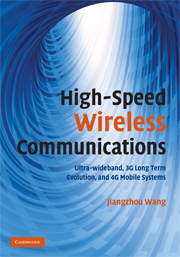Book contents
- Frontmatter
- Contents
- Preface
- Acknowledgements
- List of abbreviations
- Part I Introduction
- Part II UWB communications
- Part III Evolved 3G mobile communications
- 5 TD Receiver with ideal channel state information
- 6 TD receiver with imperfect channel estimation
- 7 QAM with antenna diversity
- 8 QAM for multicode CDMA with interference cancellation
- Part IV 4G mobile communications
- Index
- References
6 - TD receiver with imperfect channel estimation
from Part III - Evolved 3G mobile communications
Published online by Cambridge University Press: 27 May 2010
- Frontmatter
- Contents
- Preface
- Acknowledgements
- List of abbreviations
- Part I Introduction
- Part II UWB communications
- Part III Evolved 3G mobile communications
- 5 TD Receiver with ideal channel state information
- 6 TD receiver with imperfect channel estimation
- 7 QAM with antenna diversity
- 8 QAM for multicode CDMA with interference cancellation
- Part IV 4G mobile communications
- Index
- References
Summary
In this chapter, a common pilot signal transmission scheme is utilized to assist receivers to estimate the channel fading coefficients; hence, the effect of imperfect channel estimation on the TD-STBC system performance is investigated for the independent pair of channels. The power ratio of pilot to data channels and the lowpass filter used to improve the channel estimation are addressed.
Introduction
In this chapter, the TD-STBC in the DS-CDMA system with an imperfect channel estimation scheme based on the 3GPP standard [1] is studied. In the downlink of the WCDMA system, two common pilot channel signals are transmitted simultaneously from two antennas, which are employed to assist mobile stations to estimate the channel fading coefficients. In this chapter, however, it is merely assumed that the pair of channels corresponding to two transmit antennas are independent from each other. The impact of imperfect channel estimation on the system performance can be investigated through comparing the results obtained in Chapters 5 and 6. In terms of the resultant BER and system capacity, the effect of some important parameters on the system performance is also evaluated.
The rest of this chapter is organized as follows. In Section 6.2, the transmitter, channel and receiver models are described. The performance of coherent reception in the downlink of the CDMA system with and without TD-STBC are analyzed in Section 6.3. In Section 6.4, the numerical results of the system with various parameters and consequent discussions are presented. Finally, Section 6.5 summarizes and draws some conclusions.
- Type
- Chapter
- Information
- High-Speed Wireless CommunicationsUltra-wideband, 3G Long Term Evolution, and 4G Mobile Systems, pp. 170 - 197Publisher: Cambridge University PressPrint publication year: 2008



